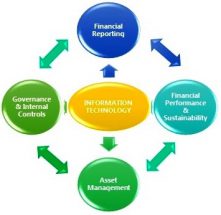Councils need to address their myriad challenges using a multi-pronged approach, with the first being financial reporting.
- This is the first in a series of articles by Ben Smith on the ‘interconnected council’. The next installment, to be published on 14 December, will focus on asset management. Following articles will explore IT, asset management and related financial matters.
Never before has the need for a council to be a well-oiled machine been so important.
Take NSW, for example. Rate capping is placing pressure on revenue growth, customer demands are increasing and, more recently, external reviews of council operations highlight the endemic challenges most are grappling with.
The NSW Auditor General’s first financial audit on local government released earlier this year highlighted that key challenges are not only common, but interconnected.
Local councils are complex businesses, in fact a collection of a number of disparate businesses, delivering a set of diverse services to a wide group of customers – residents, local business and visitors. Add to this complexity the demands applied by State Government and various challenges across the country such as funding constraints and cumbersome procurement processes.

Councils need to demonstrate compliance to acts and regulations, provide access to information, financial reporting and audit compliance. All these factors present a unique set of challenges to manage, whilst keeping service delivery performance top of mind.
The key challenges faced by councils highlighted in the auditor’s report were classified in the categories outlined in the diagram across.
Councils need to address these challenges using a multi-pronged approach, with the first being financial reporting.
Financial reporting
Financial reporting is a critical compliance activity, giving the community confidence that a council is meeting its legislated financial management responsibilities. It can be perceived as an onerous, repetitive task that does not value-add to ultimate service delivery.
Councils which have amalgamated but not yet completed transformation are dealing with multiple disconnected finance systems and a myriad of Excel spreadsheets. Any form of financial reporting each period can consequently be a real challenge.
Achieving improvements in financial reporting relies on the coordinated enhancement of two key elements: quality and timeliness.
Quality relates to governance, people, processes and systems. It means having a single source of truth of finance data in a controlled system, with limited external manipulation of data. Limiting the opportunity for working “outside of the controlled system” will have a material impact on the improved accuracy of financial data. Understanding the root cause of prior reporting errors is essential.
Timeliness is achieved through process improvement and automation. Technology obviously plays a key role here.
Tools for change
Important elements of transformational change required to position finance as a modern and valuable enabler include:
- Establishing a finance target operating model that clearly defines the finance organisation and its reporting framework.
- Developing cost models that allow finance to define the services a council provides, understand the cost of service provision, thereby providing greater insight into funding decisions.
- Defining clear finance KPIs that align to the execution of the council’s long-term strategic plans and short-term operational plans.
- Aligning risk and finance functions to enable business decisions to strike the right balance between risk and reward considerations, and create a more sustainable financial reporting environment.
- Deploying an enterprise performance management solution to provide a comprehensive, integrated decision support platform that can enable finance teams to provide significant business support and value.
- Harnessing business intelligence tools and data analytics techniques to provide more meaningful, forward-looking financial forecasts and proactively predict and manage risk.
Take-away pointers
Ultimately, there are four key areas for council leaders to discuss and consider.
First, define the key pain points. Talk to your local council finance network and advisors to see how they are tackling similar problems.
Second, perform a review of your finance function operating model, including structure, roles, skills and people. Assess your current maturity against your peers and understand the areas of focus to improve.
Third, define clear finance processes and establish a single source of truth supported by empowered data ownership.
Finally, ensure you have a clear roadmap of improvements for coordinating all finance transformation activities.
Linking financials to strategy
Some of the world’s leading councils have not only automated single systems supported by streamlined processes to support financial reporting but have transitioned to a service-based approach to forecasting and budgeting.
This not only achieves improved quality of data but establishes clear linkage of financial reporting to the council’s overarching long-term strategic community and in-year operational plans. The finance function can therefore spend less time producing and correcting transactions and reports, and more time supporting strategic council decisions about how to best leverage limited capital available for future initiatives.
Leading practice strategic asset management will also dramatically improve the quality of financial reporting. Improved management of a council’s physical asset portfolios, as well as new and existing infrastructure is a key influence on quality.
Cameron Roan is partner and Ben Smith is director at KPMG Enterprise.
Comment below to have your say on this story.
If you have a news story or tip-off, get in touch at editorial@governmentnews.com.au.
Sign up to the Government News newsletter.






Leave a Reply